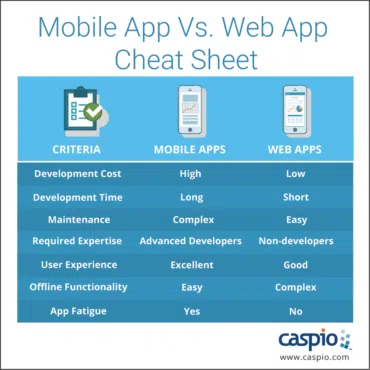Mobile App Vs. Web App: Which Should You Build for Your Business?
January 26, 2017

Mobile devices have evolved to become a necessary appendage in people’s lives. In the last decade, we saw mobile phone usage climb steadily. According to comScore’s 2016 U.S. Mobile App Report, 67% of Americans are now spending a majority of their digital time on a mobile device. From 2013 to 2016, the total digital time spent by Americans rose to 53%, with mobile and web apps driving this growth.
For businesses, this means that establishing their mobile presence is crucial to remain competitive in today’s highly-connected world. One way of doing this is by creating apps that engage these users in ways that attract and support them. But before diving deep into the development process, there is one fundamental consideration that companies need to explore: developing a mobile app vs. web app.
The Case for Mobile App vs. Web App
Application development can often pose a huge challenge to companies that are adopting a mobile strategy into their business. All major hardware manufacturers develop new mobile devices all the time. Therefore, it is important to consider the individual design, development, and testing involved with a customized app to ensure that they work well for each device.
To determine which type of app is most suited to your business, here’s a cheat sheet that summarizes the factors to consider when developing an app and how each app type performs against all criteria:

- Development Cost and Time
Developers need to design and test their mobile apps for different versions of the multiple platforms we have today, such as Apple’s iOS App Store and Google Play for Android. This means that each platform requires the creation of a separate app, which may lead to longer and multiple development cycles before you can deploy the app. Web apps only need a single development cycle for all platforms. They work consistently with all modern smartphones and tablets that have full-featured web browsers already installed.
- Maintenance
Mobile apps are more complex to maintain because developers need to write, test, and release their updates for separate platforms. And every time vendors upgrade their platforms or devices, developers also need to update their apps at the same time to ensure they maintain compatibility. Note that there are different approval processes for each platform, so this can prolong the process as well. Installation of updates is also user-dependent, so while you may have new updates available, there’s no guarantee when and if they will download the updates. Web apps are easier to maintain as you only need to update one application. Users always have the most up-to-date version of the app without having to install new updates themselves.
- Required Expertise
Mobile app development requires in-depth knowledge of several coding languages to be able to write for different platforms. Web apps, on the other hand, don’t require highly-skilled developers. Even non-IT folks can build sophisticated web apps with tools like Caspio.
- User Experience
Mobile apps can deliver the exact look and feel that you require for your business applications. They also provide a smoother experience for users because they integrate better with the native operating system of the device. Web apps may not give the same smooth experience, but the improved technologies behind web browsers help in optimizing web app user experience.
- Offline Functionality
Although not all apps require offline functionality, if your app requires this, it is easier to accomplish this with a mobile app. While some web apps can have this capability, it often needs a significant amount of work and complexity in terms of supporting different web browser standards and local device storage to make this possible.
- App Fatigue
While mobile and web app usage on devices is on the increase, there is a notable decrease in the number of downloads of new mobile apps. From a consumer perspective, aside from having too many mobile apps to work with, most new ones are not providing enough value to attract or retain users. Nowadays, consumers are using only a handful of apps that are either proven to serve their purpose or more integrated into their daily lives.
In summary, while mobile apps are significantly more costly, lengthy, and complex to build and maintain, they do make up for these by providing an excellent experience for your users. But for most business applications, it usually makes more sense to build web apps as they are more cost-effective and are optimized for all mobile devices.
The Bottom Line
Developing custom applications can add significant value to your business. A good strategy to have is optimizing these applications for mobile. But when it comes to choosing between mobile apps and web apps, at the end of the day, the choice is highly dependent on what your priorities are, what functions it will have, who are the customers they are serving, and what their specific requirements are for using the app.
For instance, data entry-based mobile B2B apps such as a field service report form can be perfectly functional as a web app. On the other hand, apps that may need native functionality or processing, such as the use of a camera or SMS, are a better fit to be developed as a mobile app.
Low-code application development platforms, such as Caspio, offers a unique approach to application development. Caspio’s low-code platform enables customers to rapidly build web database applications that satisfy their exact business requirements up to 10 times faster and at a fraction of a cost compared to traditional programming methods.
To start building mobile web apps, sign up for a free trial and request a project consultation.















